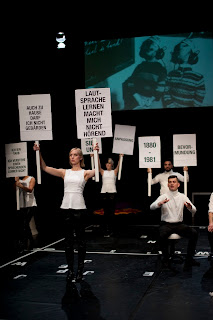By Michaela Caspar
Translated by Ylva SöderfeldtIf we look for the history of the Deaf in archives and libraries, we tend to find mostly hearing people. Hearing doctors, teachers, clergy, philosophers, linguists, or politicians and their perspective on deafness and signed languages. The hearing have documented the history of the Deaf. But what do the Deaf have to say?
 |
| Five actors on stage. Photo: Lisa Wischmann |
In order to connect current controversies on the cochlear implant (CI) with their historical background, the audience is invited to join the eight Deaf and four hearing actors on a journey through the history of the Deaf. This is the story of a largely unknown, but vital community with its own language and culture, but it is also a history of persecution and oppression.


